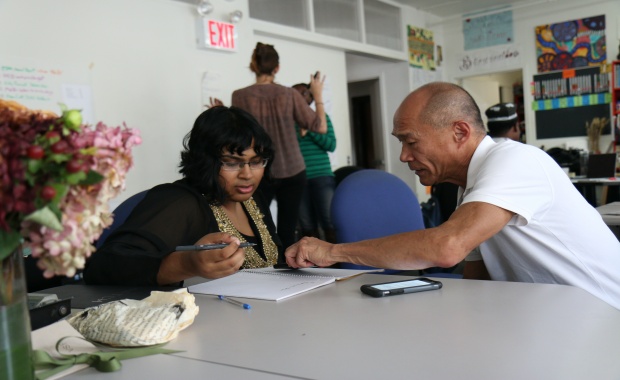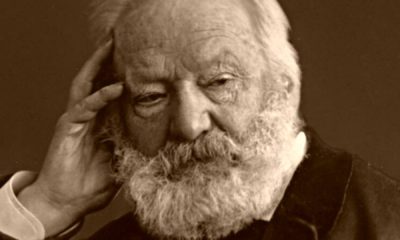Success Advice
The 3 Vital Steps Of The Apprenticeship Phase In Mastering Anything

This post is an excerpt from Mastery by Robert Greene (Viking). Mastery is the latest book from the bestselling author of The 48 Laws of Power, The Art of Seduction, The 33 Strategies of War, and The 50th Law.
In the stories of the greatest Masters, past and present, we can inevitably detect a phase in their lives in which all of their future powers were in development, like the chrysalis of a butterfly. This part of their lives—a largely self-directed apprenticeship that lasts some five to ten years—receives little attention because it does not contain stories of great achievement or discovery. Often in their Apprenticeship Phase, these types are not yet much different from anyone else. Under the surface, however, their minds are transforming in ways we cannot see but contain all of the seeds of their future success.
Much of how such Masters navigate this phase comes from an intuitive grasp of what is most important and essential for their development, but in studying what they did right we can learn some invaluable lessons for ourselves. In fact, a close examination of their lives reveals a pattern that transcends their various fields, indicating a kind of Ideal Apprenticeship for mastery. And to grasp this pattern, to follow it in our own ways, we must understand something about the very idea and necessity for passing through an apprenticeship.
In childhood we are inculcated in culture through a long period of dependency—far longer than any other animal. During this period we learn language, writing, math, and reasoning skills, along with a few others. Much of this happens under the watchful and loving guidance of parents and teachers. As we get older, greater emphasis is placed on book learning—absorbing as much information as possible about various subjects. Such knowledge of history, science, or literature is abstract, and the process of learning largely involves passive absorption. At the end of this process (usually somewhere between the ages of eighteen and twenty-five) we are then thrust into the cold, harsh work world to fend for ourselves.
When we emerge from the youthful state of dependency, we are not really ready to handle the transition to an entirely independent phase. We carry with us the habit of learning from books or teachers, which is largely unsuited for the practical, self-directed phase of life that comes next. We tend to be somewhat socially naïve and unprepared for the political games people play. Still uncertain as to our identity, we think that what matters in the work world is gaining attention and making friends. And these misconceptions and naïveté are brutally exposed in the light of the real world.
If we adjust over time, we might eventually find our way; but if we make too many mistakes, we create endless problems for ourselves. We spend too much time entangled in emotional issues, and we never quite have enough detachment to reflect and learn from our experiences. The apprenticeship, by its very nature, must be conducted by each individual in his or her own way. To follow precisely the lead of others or advice from a book is self-defeating. This is the phase in life in which we finally declare our independence and establish who we are. But for this second education in our lives, so critical to our future success, there are some powerful and essential lessons that we all can benefit from, that can guide us away from common mistakes and save us valuable time.
These lessons transcend all fields and historical periods because they are connected to something essential about human psychology and how the brain itself functions. They can be distilled into one overarching principle for the Apprenticeship Phase, and a process that loosely follows three steps.
The principle is simple and must be engraved deeply in your mind: the goal of an apprenticeship is not money, a good position, a title, or a diploma, but rather the transformation of your mind and character—the first transformation on the way to mastery. You enter a career as an outsider. You are naïve and full of misconceptions about this new world. Your head is full of dreams and fantasies about the future. Your knowledge of the world is subjective, based on emotions, insecurities, and limited experience. Slowly, you will ground yourself in reality, in the objective world represented by the knowledge and skills that make people successful in it. You will learn how to work with others and handle criticism. In the process you will transform yourself from someone who is impatient and scattered into someone who is disciplined and focused, with a mind that can handle complexity. In the end, you will master yourself and all of your weaknesses.
This has a simple consequence: you must choose places of work and positions that offer the greatest possibilities for learning. Practical knowledge is the ultimate commodity, and is what will pay you dividends for decades to come—far more than the paltry increase in pay you might receive at some seemingly lucrative position that offers fewer learning opportunities. This means that you move toward challenges that will toughen and improve you, where you will get the most objective feedback on your performance and progress. You do not choose apprenticeships that seem easy and comfortable.
In this sense you must see yourself as following in the footsteps of Charles Darwin. You are finally on your own, on a voyage in which you will craft your own future. It is the time of youth and adventure—of exploring the world with an open mind and spirit. In fact, whenever you must learn a new skill or alter your career path later in life, you reconnect with that youthful, adventurous part of yourself. Darwin could have played it safe, collecting what was necessary, and spending more time on board studying instead of actively exploring. In that case, he would not have become an illustrious scientist, but just another collector. He constantly looked for challenges, pushing himself past his comfort zone. He used danger and difficulties as a way to measure his progress. You must adopt such a spirit and see your apprenticeship as a kind of journey in which you will transform yourself, rather than as a drab indoctrination into the work world.
The Apprenticeship Phase — The Three Steps or Modes
With the principle outlined above guiding you in your choices, you must think of three essential steps in your apprenticeship, each one overlapping the other. These steps are: Deep Observation (The Passive Mode), Skills Acquisition (The Practice Mode), and Experimentation (The Active Mode). Keep in mind that an apprenticeship can come in many different forms. It can happen at one place over several years, or it can consist of several different positions in different places, a kind of compound apprenticeship involving many different skills. It can include a mix of graduate school and practical experience. In all of these cases, it will help you to think in terms of these steps, although you may need to give added weight to a particular one depending on the nature of your field.
Step One: Deep Observation—The Passive Mode
When you enter a career or new environment, you move into a world with its own rules, procedures, and social dynamic. For decades or even centuries, people have compiled knowledge of how to get things done in a particular field, each generation improving on the past. In addition, every workplace has its own conventions, rules of behavior, and work standards. There are also all kinds of power relationships that exist between individuals. All of this represents a reality that transcends your individual needs and desires. And so your task upon entering this world is to observe and absorb its reality as deeply as possible.
The greatest mistake you can make in the initial months of your apprenticeship is to imagine that you have to get attention, impress people, and prove yourself. These thoughts will dominate your mind and close it off from the reality around you. Any positive attention you receive is deceptive; it is not based on your skills or anything real, and it will turn against you. Instead, you will want to acknowledge the reality and submit to it, muting your colors and keeping in the background as much as possible, remaining passive and giving yourself the space to observe. You will also want to drop any preconceptions you might have about this world you are entering. If you impress people in these first months, it should be because of the seriousness of your desire to learn, not because you are trying to rise to the top before you are ready.
You will be observing two essential realities in this new world. First, you will observe the rules and procedures that govern success in this environment—in other words, “this is how we do things here.” Some of these rules will be communicated to you directly—generally the ones that are superficial and largely a matter of common sense. You must pay attention to these and observe them, but what is of more interest are the rules that are unstated and are part of the underlying work culture. These concern style and values that are considered important. They are often a reflection of the character of the man or woman on top.
You can observe such rules by looking at those who are on their way up in the hierarchy, who have a golden touch. More tellingly, you can observe those who are more awkward, who have been chastised for particular mistakes or even been fired. Such examples serve as negative trip wires: do things this way and you will suffer.
The second reality you will observe is the power relationships that exist within the group: who has real control; through whom do all communications flow; who is on the rise and who is on the decline. These procedural and political rules may be dysfunctional or counterproductive, but your job is not to moralize about this or complain, but merely to understand them, to get a complete lay of the land. You are like an anthropologist studying an alien culture, attuned to all of its nuances and conventions. You are not there to change that culture; you will only end up being killed, or in the case of work, fired. Later, when you have attained power and mastery, you will be the one to rewrite or destroy these same rules.
Every task you are given, no matter how menial, offers opportunities to observe this world at work. No detail about the people within it is too trivial. Everything you see or hear is a sign for you to decode. Over time, you will begin to see and understand more of the reality that eluded you at first. For instance, a person whom you initially thought had great power ended up being someone with more bark than bite. Slowly, you begin to see behind the appearances. As you amass more information about the rules and power dynamics of your new environment, you can begin to analyze why they exist, and how they relate to larger trends in the field. You move from observation to analysis, honing your reasoning skills, but only after months of careful attention.
We can see how Charles Darwin followed this step quite clearly. By spending the first few months studying life on board the ship and perceiving the unwritten rules, he made his time for science much more productive. By enabling himself to fit in, he was able to avoid needless battles that would have later disrupted his scientific work, not to mention the emotional turmoil these would have presented to him. He later practiced the same technique with gauchos and other local communities he came in contact with. This allowed him to extend the regions he could explore and the specimens he could collect. On another level, he slowly transformed himself into perhaps the most astute observer of nature the world has ever known. Emptying himself of any preconceptions about life and its origins, Darwin trained himself to see things as they are. He did not theorize or generalize about what he was seeing until he had amassed enough information. Submitting to and absorbing the reality of all aspects of this voyage, he ended up piercing one of the most fundamental realities of all—the evolution of all living forms.
Understand: there are several critical reasons why you must follow this step. First, knowing your environment inside and out will help you in navigating it and avoiding costly mistakes. You are like a hunter: your knowledge of every detail of the forest and of the ecosystem as a whole will give you many more options for survival and success. Second, the ability to observe any unfamiliar environment will become a critical lifelong skill. You will develop the habit of stilling your ego and looking outward instead of inward. You will see in any encounter what most people miss because they are thinking of themselves. You will cultivate a keen eye for human psychology, and strengthen your ability to focus. Finally, you will become accustomed to observing first, basing your ideas and theories on what you have seen with your eyes, and then analyzing what you find. This will be a very important skill for the next, creative phase in life.
Step Two: Skills Acquisition—The Practice Mode
At some point, as you progress through the initial months of observation required in an apprenticeship, you will enter a critical stage: practice toward the acquisition of skills. Every human activity, endeavor, or career path involves the mastering of skills. In some fields, it is direct and obvious, like operating a tool or machine or creating something physical. In others, it is more of a mix of the physical and mental, such as the observing and collecting of specimens for Charles Darwin. In still others, the skills are more nebulous, such as handling people or researching and organizing information. As much as possible, you want to reduce these skills to something simple and essential—the core of what you need to get good at, skills that can be practiced.
In acquiring any kind of skill, there exists a natural learning process that coincides with the functioning of our brains. This learning process leads to what we shall call tacit knowledge—a feeling for what you are doing that is hard to put into words but easy to demonstrate in action. And to understand how this learning process operates, it is useful to look at the greatest system ever invented for the training of skills and the achievement of tacit knowledge—the apprenticeship system of the Middle Ages. This system arose as a solution to a problem: As business expanded in the Middle Ages, Masters of various crafts could no longer depend on family members to work in the shop. They needed more hands. But it was not worth it for them to bring in people who would come and go—they needed stability and time to build up skills in their workers. And so they developed the apprenticeship system, in which young people from approximately the ages of twelve to seventeen would enter work in a shop, signing a contract that would commit them for the term of seven years. At the end of this term, apprentices would have to pass a master test, or produce a master work, to prove their level of skill. Once passed, they were now elevated to the rank of journeymen and could travel wherever there was work, practicing the craft.
Because few books or drawings existed at the time, apprentices would learn the trade by watching Masters and imitating them as closely as possible. They learned through endless repetition and hands-on work, with very little verbal instruction (the word “apprentice” itself comes from the Latin prehendere, meaning to grasp with the hand). Because resources such as textiles, wood, and metals were expensive and could not be wasted on practice runs, apprentices would spend most of their time working directly on materials that would be used for the final product. They had to learn how to focus deeply on their work and not make mistakes.
If one added up the time that apprentices ended up working directly on materials in those years, it would amount to more than 10,000 hours, enough to establish exceptional skill level at a craft. The power of this form of tacit knowledge is embodied in the great Gothic cathedrals of Europe—masterpieces of beauty, craftsmanship, and stability, all erected without blueprints or books. These cathedrals represented the accumulated skills of numerous craftsmen and engineers.
What this means is simple: language, oral and written, is a relatively recent invention. Well before that time, our ancestors had to learn various skills—toolmaking, hunting, and so forth. The natural model for learning, largely based on the power of mirror neurons, came from watching and imitating others, then repeating the action over and over. Our brains are suited for this form of learning. In an activity such as riding a bicycle, we all know that it is easier to watch someone and follow their lead than to listen to or read instructions. The more we do it, the easier it becomes. Even with skills that are primarily mental, such as computer programming or speaking a foreign language, it remains the case that we learn best through practice and repetition—the natural learning process. We learn a foreign language by actually speaking it as much as possible, not by reading books and absorbing theories. The more we speak and practice, the more fluent we become.
Once you take this far enough, you enter a cycle of accelerated returns in which the practice becomes easier and more interesting, leading to the ability to practice for longer hours, which increases your skill level, which in turn makes practice even more interesting. Reaching this cycle is the goal you must set for yourself, and to get there you must understand some basic principles about skills themselves.
First, it is essential that you begin with one skill that you can master, and that serves as a foundation for acquiring others. You must avoid at all cost the idea that you can manage learning several skills at a time. You need to develop your powers of concentration, and understand that trying to multi task will be the death of the process.
Second, the initial stages of learning a skill invariably involve tedium. Yet rather than avoiding this inevitable tedium, you must accept and embrace it. The pain and boredom we experience in the initial stage of learning a skill toughens our minds, much like physical exercise. Too many people believe that everything must be pleasurable in life, which makes them constantly search for distractions and short-circuits the learning process. The pain is a kind of challenge your mind presents—will you learn how to focus and move past the boredom, or like a child will you succumb to the need for immediate pleasure and distraction? Much as with physical exercise, you can even get a kind of perverse pleasure out of this pain, knowing the benefits it will bring you. In any event, you must meet any boredom head-on and not try to avoid or repress it. Throughout your life you will encounter tedious situations, and you must cultivate the ability to handle them with discipline.
In practicing a skill in the initial stages, something happens neurologically to the brain that is important for you to understand. When you start something new, a large number of neurons in the frontal cortex (the higher, more conscious command area of the brain) are recruited and become active, helping you in the learning process. The brain has to deal with a large amount of new information, and this would be stressful and overwhelming if only a limited part of the brain were used to handle it. The frontal cortex even expands in size in this initial phase, as we focus hard on the task. But once something is repeated often enough, it becomes hardwired and automatic, and the neural pathways for this skill are delegated to other parts of the brain, farther down the cortex. Those neurons in the frontal cortex that we needed in the initial stages are now freed up to help in learning something else, and the area goes back to its normal size.
In the end, an entire network of neurons is developed to remember this single task, which accounts for the fact that we can still ride a bicycle years after we first learned how to do so. If we were to take a look at the frontal cortex of those who have mastered something through repetition, it would be remarkably still and inactive as they performed the skill. All of their brain activity is occurring in areas that are lower down and require much less conscious control.
This process of hardwiring cannot occur if you are constantly distracted, moving from one task to another. In such a case, the neural pathways dedicated to this skill never get established; what you learn is too tenuous to remain rooted in the brain. It is better to dedicate two or three hours of intense focus to a skill than to spend eight hours of diffused concentration on it. You want to be as immediately present to what you are doing as possible.
Once an action becomes automatic, you now have the mental space to observe yourself as you practice. You must use this distance to take note of your weaknesses or flaws that need correction—to analyze yourself. It helps also to gain as much feedback as possible from others, to have standards against which you can measure your progress so that you are aware of how far you have to go. People who do not practice and learn new skills never gain a proper sense of proportion or self-criticism. They think they can achieve anything without effort and have little contact with reality. Trying something over and over again grounds you in reality, making you deeply aware of your inadequacies and of what you can accomplish with more work and effort.
If you take this far enough, you will naturally enter the cycle of accelerated returns: As you learn and gain skills you can begin to vary what you do, finding nuances that you can develop in the work, so that it becomes more interesting. As elements become more automatic your mind is not exhausted by the effort and you can practice harder, which in turn brings greater skill and more pleasure. You can look for challenges, new areas to conquer, keeping your interest at a high level. As the cycle accelerates, you can reach a point where your mind is totally absorbed in the practice, entering a kind of flow in which everything else is blocked out. You become one with the tool or instrument or thing you are studying. Your skill is not something that can be put into words; it is embedded in your body and nervous system—it becomes tacit knowledge. Learning any kind of skill deeply prepares you for mastery. The sensation of flow and of being a part of the instrument is a precursor to the great pleasures that mastery can bring.
In essence, when you practice and develop any skill you transform yourself in the process. You reveal to yourself new capabilities that were previously latent, that are exposed as you progress. You develop emotionally. Your sense of pleasure becomes redefined. What offers immediate pleasure comes to seem like a distraction, an empty entertainment to help pass the time. Real pleasure comes from overcoming challenges, feeling confidence in your abilities, gaining fluency in skills, and experiencing the power this brings. You develop patience. Boredom no longer signals the need for distraction, but rather the need for new challenges to conquer.
Although it might seem that the time necessary to master the requisite skills and attain a level of expertise would depend on the field and your own talent level, those who have researched the subject repeatedly come up with the number of 10,000 hours. This seems to be the amount of quality practice time that is needed for someone to reach a high level of skill and it applies to composers, chess players, writers, and athletes, among others. This number has an almost magical or mystical resonance to it. It means that so much practice time—no matter the person or the field—leads to a qualitative change in the human brain. The mind has learned to organize and structure large amounts of information. With all of this tacit knowledge, it can now become creative and playful with it. Although the number of hours might seem high, it generally adds up to seven to ten years of sustained, solid practice—roughly the period of a traditional apprenticeship. In other words, concentrated practice over time cannot fail but produce results.
Step Three: Experimentation—The Active Mode
This is the shortest part of the process, but a critical component nonetheless. As you gain in skill and confidence, you must make the move to a more active mode of experimentation. This could mean taking on more responsibility, initiating a project of some sort, doing work that exposes you to the criticisms of peers or even the public. The point of this is to gauge your progress and whether there are still gaps in your knowledge. You are observing yourself in action and seeing how you respond to the judgments of others. Can you take criticism and use it constructively?
With Charles Darwin, as the voyage progressed and he began to entertain the notions that would lead to his theory of evolution, he decided to expose his ideas to others. First, on the Beagle, he discussed them with the captain and patiently absorbed his vehement criticisms of the idea. This, Darwin told himself, would be more or less the reaction of the public, and he would have to prepare himself for that. He also began to write letters to various scientists and scientific societies back in England. The responses he received indicated he was on to something, but that he would need some more research. For Leonardo da Vinci, as he progressed in his studio work for Verrocchio, he began to experiment and to assert his own style. He found to his surprise that the Master was impressed with his inventiveness. For Leonardo, this indicated that he was near the end of his apprenticeship.
Most people wait too long to take this step, generally out of fear. It is always easier to learn the rules and stay within your comfort zone. Often you must force yourself to initiate such actions or experiments before you think you are ready. You are testing your character, moving past your fears, and developing a sense of detachment to your work—looking at it through the eyes of others. You are getting a taste for the next phase in which what you produce will be under constant scrutiny.
You will know when your apprenticeship is over by the feeling that you have nothing left to learn in this environment. It is time to declare your independence or move to another place to continue your apprenticeship and expand your skill base. Later in life, when you are confronted with a career change or the need to learn new skills, having gone through this process before, it will become second nature. You have learned how to learn.
Business
Scaling a Business? Here’s What Usually Goes Wrong
Before you hire, expand, or chase bigger revenue, here’s what every founder needs to fix to scale without losing control, culture, or quality.

Growing a business is the dream. But scaling one? Honestly, that is a completely different reality. (more…)
Personal Development
From Classroom to Boardroom – How to Transition Successfully
Moving from classroom to corporate? Here’s how to navigate career transitions, master workplace culture, and stand out in the boardroom.

The transition from academic life to corporate work is major and often tough, requiring careful planning and preparation. (more…)
Did You Know
This Move Can Help You Keep More of Your Income
What if keeping more of your income wasn’t about earning more, but choosing a smarter place to live?

Living more cheaply often makes the biggest difference when money is tight. If rent feels too heavy or bills climb faster than expected, changing where you live might help a lot. (more…)
Business
How to Build a Brand That Actually Connects (For Businesses of Any Size)
Brand growth in 2026 isn’t about shouting louder; it’s about clarity, consistency, and human connection that customers genuinely trust.

In the middle of a busy workday, it’s easy to view brand building as a luxury. Honestly, we often treat it like a coat of paint we apply after the house is built. But as we navigate the landscape of 2026, it’s become clear that branding is actually the foundation. (more…)
-

 Business3 weeks ago
Business3 weeks agoHow Smart Brands Use Instagram Data to Outperform Competitors
-

 Business4 weeks ago
Business4 weeks agoThe Paradox of Modern Work: Can Tech Make Us More Human?
-

 Change Your Mindset3 weeks ago
Change Your Mindset3 weeks agoThe Hidden Reason You Can’t Stay Consistent
-

 Change Your Mindset3 weeks ago
Change Your Mindset3 weeks agoThe Real Psychology Behind Quitting Too Soon
-

 Entrepreneurs2 weeks ago
Entrepreneurs2 weeks agoThe Six Pillars That Ground Purpose-Driven Leadership (The Berenyi Life Blueprint)
-

 Business3 weeks ago
Business3 weeks agoDIY vs Delegate: The Real Reason You’re Burned Out
-

 Business3 weeks ago
Business3 weeks agoHow AI Agents Can Quietly Expose Your Business to Serious Risk
-

 Life2 weeks ago
Life2 weeks agoWhy Moving to a New City Can Change Your Mindset





























4 Comments